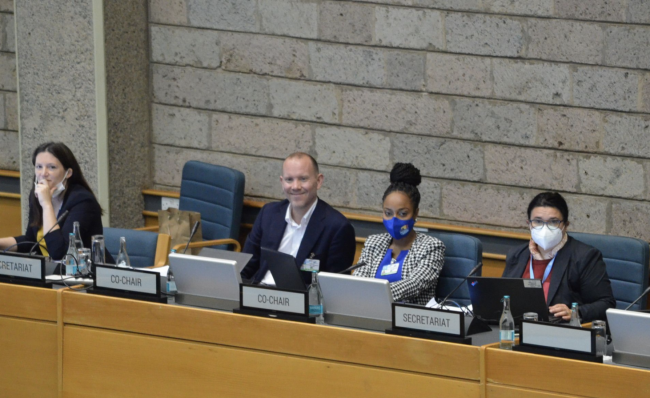“We appreciate the effort to clarify this text.” “Thank you for the clear explanation.”
These and similar refrains were heard throughout Tuesday as delegates at the resumed session of the 12th meeting of the Open-ended Working Group of the Basel Convention (OEWG-12) met in various contact groups. They covered a wide range of issues in an agenda-heavy day.
In the Technical Matters Contact Group, delegates discussed the updated technical guidelines on the environmentally sound management (ESM) of wastes consisting of, containing, or contaminated with mercury or mercury compounds, where delegates heard the relevant results of the fourth meeting of the Conference of the Parties of the Minamata Convention (COP-4.2) and considered a revised guideline text that takes into account comments submitted by parties since Basel COP-15.1 and the Minamata COP-4.2 outcomes. The group focused first on reviewing the former set of proposed revisions, with plans to return to the Minamata COP-inspired revisions during the group’s evening session.
On the updated technical guidelines on the incineration on land and on specially engineered landfills, delegates agreed on draft updated technical guidelines on the environmentally sound incineration of hazardous wastes and other wastes as covered by disposal operations D10 and R1, and discussed whether to endorse a single liner system or double liner with leak detection system for specially engineered landfills for hazardous wastes.
On the updated technical guidelines on the environmentally sound management (ESM) of wastes consisting of, containing, or contaminated with persistent organic pollutants (POPs), delegates reviewed and approved revisions to the draft updated technical guidelines on the ESM of wastes consisting of, containing, or contaminated with certain POPs pesticides or with hexachlorobenzene as an industrial chemical.
They also discussed the draft updated general technical guidelines on the ESM of wastes consisting of, containing, or contaminated with POPs. Delegates, among other things, agreed that further work on low-POP content will await COP-15 discussion.
The Technical Matters Contact Group continued its discussions into Tuesday evening.
In the Strategic Matters Contact Group, delegates addressed the Basel Convention Partnership Programme, specifically the follow-up partnership to the Partnership for Action on Computing Equipment (PACE). They addressed three key aspects: the revised terms of reference (ToR) and work programme for the biennium 2020-2021 of the follow-up partnership to PACE (“PACE II”); the draft work programme of PACE II for the biennium 2022-2023; and the draft decision on PACE II.
On the revised ToR for PACE II, parties and observers engaged with text on, among others, undertaking special outreach to youth, stakeholder categories, the circular economy, and life-cycle thinking. On the 2022-2023 PACE II work programme, parties exchanged views on the development of guidance documents and pilot projects. The parties then swiftly agreed on the PACE section of the draft decision text, agreeing to recommend that COP-15 adopt, rather than simply welcome, the amendments to the ToR for the inclusion of new e-waste types and the proposed work programme for 2022-2023.
The Strategic Matters Contact Group reconvened in the evening to consider the Strategic Framework.
The Legal Matters Contact Group discussed issues around the agenda item on legal clarity, focusing on recommendations on changing Convention Annex entries relevant to e-waste (A1180 and B1110 in Annexes VIII and IX to the Basel Convention, respectively, which will mirror each other). These entries broadly deal with whole equipment, components, and fractions from pre-treatment or treatment. After extensive discussions, the parties agreed on several options to forward to COP-15.
To receive free coverage of global environmental events delivered to your inbox, subscribe to the ENB Update newsletter.














